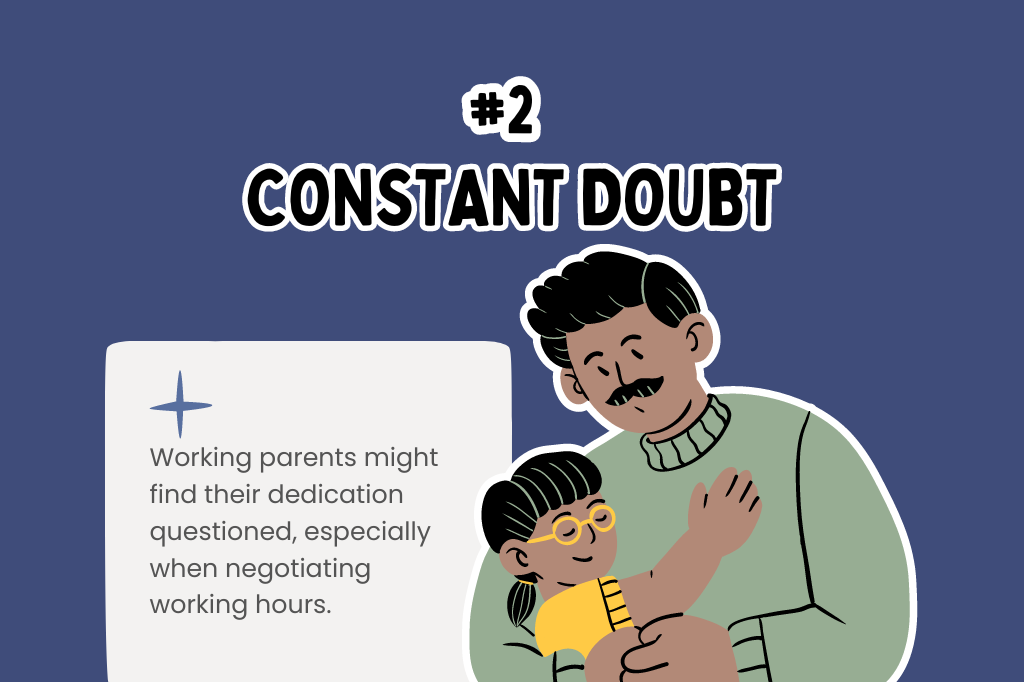The fast-paced (and demanding) rhythm of software startups can often bring on the challenge of maintaining work-life balance… which can be particularly daunting for working parents. Whether you find yourself coding at home or in a bustling office, the juggle between professional commitments and family responsibilities can leave you feeling stretched thin.
It’s time to recognize that you deserve a break. This article explores the unique challenges faced by working parents in software teams and provides actionable tips on self-management, time management, and stress reduction.
4 Challenges Working Parents Face
Picture this: You’re a dedicated professional with a passion for software engineering or product development, navigating the intricate world of code, projects, and innovations. But amidst the hustle and bustle of your dynamic role, there’s another layer to your identity – that of a parent.
Balancing the demands of crafting top-notch code or spearheading product strategies with the responsibilities of parenthood can be an intricate juggling act. Deadlines loom, meetings pile up, and your little one’s soccer practice seems to clash with a critical project discussion.
Time becomes a scarce resource, and finding the right flow between your career and family feels like solving a complex algorithm. Yet, it can be done with the help of empathetic peers, friends, and family.
Challenge 1. The Constant Struggle

For many working parents caught up in software development processes, the constant struggle is real. You’re devoted to your work, but there are times when you feel like you’re not giving it your all.
The guilt associated with not being able to pour 100% into both work and family life can be overwhelming. It’s crucial to acknowledge that it’s okay not to be perfect in every aspect of your life.
How to Get Help From Your Support Network
Family can:
- Encourage open communication with your family about work expectations.
- Share your workload and discuss strategies for balancing work and family responsibilities.
- Seek their understanding and support during demanding work periods.
Leadership can:
- Foster a collaborative work environment where development team members can share the workload.
- Discuss realistic timelines and expectations with colleagues to avoid unnecessary stress.
- Establish a culture of mutual support and understanding within the team.
Challenge 2. Navigating Doubts and Dedication

As a working parent, you might find your dedication questioned, especially when you choose flexibility to meet family needs. It’s important to communicate openly with your team about your working hours and establish boundaries.
When working from home, create a dedicated workspace that signals to your family when you’re in work mode.
How to Handle Your Interactions at Work
Research shows that while 73% of the workforce acknowledges their role as caregivers, only 56% indicate that their work supervisor is aware of their caregiving responsibilities.
With Bosses/Supervisors:
- Maintain transparent communication with your supervisors about your commitments outside of work.
- Demonstrate your dedication through consistent and high-quality work.
- Discuss flexible work arrangements that align with both personal and professional responsibilities.
With Colleagues:
- Collaborate effectively on team projects to showcase your commitment to the team’s success.
- Establish trust through clear communication and meeting deadlines.
- Acknowledge and appreciate the dedication of your colleagues, fostering a positive work environment.
3. The Elusive Transition

Transitioning from work to home and vice versa can be tough, especially when the lines between the two blur. Set clear boundaries for work hours, and when the workday ends, take deliberate steps to transition your mind away from professional tasks.
Consider adopting a short mindfulness practice or a ritual that signals the end of the workday.
Aligning Expectations at Home and With the Team
Family:
- Establish clear boundaries for work hours and personal time with your family.
- Communicate when you are transitioning from work mode to family time.
- Create a designated workspace at home to physically separate work from personal life.
Colleagues:
- Discuss strategies with colleagues for effective work transitions, such as setting specific “end-of-day” rituals.
- Share tips on maintaining a work-life balance and switching off after work hours.
- Encourage a supportive work culture that respects personal time.
Challenge 4. The Myth of ‘Me’ Time

Finding time for yourself can feel like an impossible task. However, it’s crucial for your well-being. Schedule ‘me’ time on your calendar just like any other appointment. It could be as simple as a short walk, reading a book, or practicing a hobby.
Remember, taking care of yourself is not a luxury, but a necessity.
How To Make Allies and Protect Your Well-being
Family:
- Collaborate with your family to schedule dedicated “me time” where you can unwind.
- Share responsibilities with your partner or family members to create pockets of personal time.
- Communicate your need for occasional breaks to recharge.
Bosses/Supervisors:
- Advocate for a workplace culture that values breaks and self-care.
- Discuss realistic workloads to ensure employees have time for self-care.
- Encourage the use of vacation days and time-off policies.
Remember, building a strong support network involves open communication and a culture of understanding. It’s essential to tailor these suggestions to individual preferences and workplace dynamics.
Self-Management Advice for Parents At Work
Prioritize Tasks
Imagine you have a major product release deadline approaching, but your child’s school play is also scheduled for the same evening. What do you do? Identify the most crucial tasks for the day and focus on those first.
Identify the key tasks critical for the product release and allocate focused time for them earlier in the day. By prioritizing, you ensure that essential work is completed, allowing you to attend and enjoy the school play without the looming stress of impending tasks.
Learn to Say No
New scenario: your team is proposing additional features for the current sprint, but your plate is already full of existing commitments. In this type of situation, you can politely decline the additional work, explaining that your current workload requires dedicated attention.
It’s okay to decline additional work when you’re stretched thin. This ensures that your focus remains on delivering quality results for the tasks at hand without compromising your well-being or the quality of your work.
Set Realistic Goals
Easier said than done, but: Don’t overcommit. Be realistic about what you can accomplish in a given timeframe. Even if you are enthusiastic about contributing to a new project, it’s important to recognize if family commitments limit your available time.
Instead of overcommitting, assess the time realistically available for the new project. Set achievable goals aligned with your schedule, allowing you to make meaningful contributions without overwhelming yourself. This ensures that both your professional and personal responsibilities are managed effectively.
Time Management Tips to Balance Work and Parenthood
Establish a Routine With Time Blocking
Let’s say your work demands flexibility, and you find it challenging to create a consistent schedule due to unpredictable project requirements. How can you create a daily routine that accommodates both work and family commitments?
Implement time blocking by establishing fixed periods on your calendar for focused work, family activities, and personal time.
Even in a flexible work environment, having designated periods for focused work, family time, and personal breaks helps maintain balance. Ensure these blocks are respected and communicated to colleagues, reducing scheduling conflicts and allowing for a more balanced allocation of your time.
Leverage Technology
We know juggling between work-related apps, family schedules, and personal to-dos becomes overwhelming. That’s why we recommend you use productivity tools and apps to streamline tasks and manage your time effectively.
For instance, use a calendar app that combines work meetings, family events, and personal tasks in one place. Leverage task management apps to prioritize and track your responsibilities efficiently, ensuring nothing gets overlooked amidst the hustle of work and parenting.
Use features like “Do Not Disturb” on communication tools during designated personal hours, reinforcing the importance of maintaining a healthy work-life balance.
Recommendations on How to Deal With Stress
Practice Mindfulness
The constant demands of work and family life create a high-stress environment, making it challenging to stay focused and calm. To counterbalance this, incorporate mindfulness or meditation into your daily routine.
Dedicate a few minutes each morning or evening to mindfulness or meditation exercises. Apps like Headspace or Calm can guide you through quick sessions, helping you center yourself and alleviate stress before tackling your responsibilities.
Stay Connected
The pressure from work and parenting responsibilities can leave you feeling isolated and overwhelmed. Share your feelings with a trusted friend, family member, or colleague who can offer support and understanding.
Connecting with others provides an outlet for expressing your challenges and can bring valuable perspectives. This external support system can help alleviate stress and create a sense of camaraderie.
Set Boundaries
The blurred lines between work and personal life contribute to a constant feeling of being on-call, leading to burnout.
Clearly define boundaries between work and personal space. Communicate these boundaries with your team, ensuring they understand when you are available and when you need personal time or privacy.
Balancing the demands of having to build and maintain software applications with parenting responsibilities is undoubtedly challenging. However, by acknowledging the difficulties, implementing effective self-management and time management strategies, and prioritizing self-care, you can create a more harmonious and fulfilling life.
Remember, you deserve a break, and embracing balance will ultimately lead to a happier, healthier you.
Off Hours: Relaxation Hints for Working Parents Who Create Software
After a demanding day of coding and managing projects, finding time to relax as a working parent can be challenging. The pressures of both professional and family responsibilities can take a toll on your well-being.
To ensure you enjoy some much-needed ‘me time,’ consider incorporating these relaxation tips into your daily routine:
Scheduled Downtime
Prioritize relaxation by scheduling a specific amount of time to unwind into your day. Set aside short periods to do nothing, achieving a healthy work-life balance.
Disconnect from Work
Switch off your work devices as you step out of the virtual office. Disconnecting from work allows you to focus on personal and family time, reducing stress associated with constant work-related thoughts — even if it is for taking on the cognitive dimension of household labor.
Rejuvenating Shower or Bath
Wash away the tension with a warm shower or bath. Water’s calming effect on the mind and body can help you unwind and transition from work mode to personal time.
Exercise for Stress Relief
Engage in exercise to release endorphins and alleviate stress. Whether it’s a solo workout or team sports, physical activity contributes to a happier and more energetic you.
Change of Scenery
Step out of the house for a change of scenery. Embrace nature, even if it’s just your garden, to breathe in fresh air and shift your focus away from work pressures.
Soothing Music Break
Escape with calming tunes to influence your mood positively. Opt for slower music that allows you to close your eyes, breathe, and lower your heart rate.
Escape with a Book or TV Series
Distract Your Mind: Immerse yourself in a book or TV series to escape the chaos of the day-to-day. Engaging in fiction or a favorite series can provide a mental break.
Company and Distraction
Shift Focus: Decide whether solitude or the company of loved ones helps you relax more. Distraction or a comforting hug from a friend or family member can effectively reduce stress.
Prioritize Quality Sleep
Set the stage for a good night’s sleep by preparing early. Create a sleep-friendly environment, disconnect from electronic devices, and prioritize quality rest for optimal energy restoration.
Bonus Tip: If possible, send the kids to grandpa and grandma’s house for the night to maximize your relaxation time!
Remember, finding the right balance is a personal journey, and integrating these relaxation tips can contribute to a happier and healthier life.
Don’t Forget You’re Human
Are you a person who finds it difficult to unwind? You’re not alone. Perhaps you have responsibilities at home that require your attention — cooking, cleaning, looking after the kids.
Maybe you try to get a head start on the next day’s workload, by working into the night? Continuing on in this way can be physically and mentally taxing as your body continues to expend energy. Over time, this can have a serious impact on your overall wellbeing.
Ubiminds understands the unique challenges of balancing software careers and parenting, especially in Latin American teams. Our expert solutions empower you to achieve a harmonious work-life balance, leading to improved quality of life and enhanced work outcomes.
Fill out the form to learn more about how Ubiminds supports companies and team members in creating a healthier, more productive work environment.

International Marketing Leader, specialized in tech. Proud to have built marketing and business generation structures for some of the fastest-growing SaaS companies on both sides of the Atlantic (UK, DACH, Iberia, LatAm, and NorthAm). Big fan of motherhood, world music, marketing, and backpacking. A little bit nerdy too!











